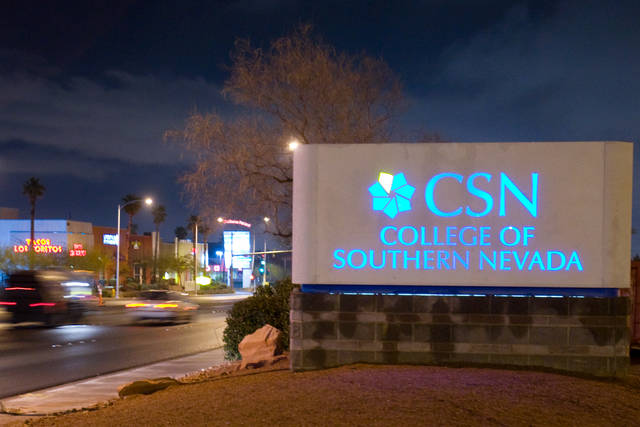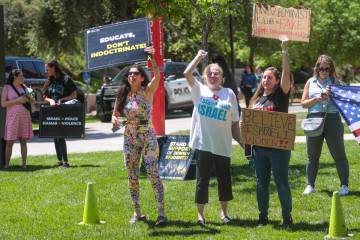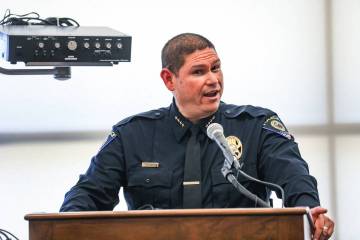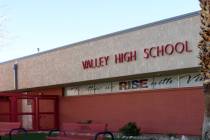Bill would create new Nevada community college system
A bill introduced in the Legislature is aimed at creating a separate governing body for Nevada’s community colleges — something proponents have pushed for years.
Senate Bill 321, introduced March 22 and referred to the Senate Education Committee, would create the Nevada System of Community Colleges. The bill’s primary sponsors are Sens. James Settelmeyer, R-Minden; Sen. Scott Hammond, R-Las Vegas; and Sen. Ira Hansen, R-Sparks.
If the bill became law, community colleges would be removed from the Nevada System of Higher Education’s authority effective July 1, 2022. But NSHE’s chancellor opposes the move, saying it would come with a significant price that the state can’t afford and would make it harder for students to transfer from two- to four-year schools.
NSHE currently oversees eight public schools, including four community colleges: College of Southern Nevada, Truckee Meadows Community College in Reno, Western Nevada College in Carson City and Great Basin College in Elko.
The state community college system would have its own governing body, with members appointed by the governor, according to the bill text. The board would appoint an executive director. And each community college would also have its own governor-appointed board of trustees.
Gov. Steve Sisolak referenced the concept in his January State of the State address, saying there needs to be recognition that community colleges will play a larger role in workforce training as part of COVID-19 recovery efforts.
“That’s why I will be asking the Legislature to work with the Nevada System of Higher Education over the next two years to develop a framework transitioning Nevada’s community colleges to a new independent authority that will focus on making Nevadans’ job ready,” he said in the address.
In a March 26 statement to the Review-Journal, NSHE Chancellor Melody Rose said the higher education system “respectfully opposes” the bill.
“The financial costs to create several new layers of government and administrative systems, some of which duplicate critical centralized services, will be significant and unnecessary expenses our state cannot afford,” she said.
The bill would also create academic hardships for students by disconnecting two- and four-year universities, which would affect the transfer process that saves students time and money, Rose said.
NSHE will continue to work with Sisolak to “accelerate our community college workforce development efforts,” she said.
The proposal to create a separate community college system has been floated in the Legislature before. In 2017, though, all four community college presidents opposed it.
John Gwaltney, former president of Truckee Meadows Community College, is part of a group of six retired community college presidents in the state who are pushing the effort and working with bill sponsors.
The idea dates to at least 2013, when a new state higher education funding formula was approved, he said.
“I hesitate to use the term ‘formula’ because it seems to imply equity in this, and frankly there is none,” Gwaltney said.
Gwaltney alleges there was no data justification for the funding model and that it disproportionately shifted state resources toward universities.
“That has created a number of difficulties for community colleges, which translates to making it more difficult for the most vulnerable students,” he said.
Gwaltney spent nearly 10 years as president at Truckee Meadows Community College, from 1986-1994, and has more than 20 years of community college presidential experience.
He said people who are critical of Nevada’s higher education system “are generally not employed there for very long” and it’s unrealistic to think current community college presidents would publicly support an effort to create a separate community college system.
Within Nevada’s higher education system, you’re supposed to be a team player, he said.
“The rules are community colleges lose, and you’re supposed to accept that,” Gwaltney said.
There has long been contention between NSHE and state legislators. A 2015 Review-Journal story — which cited 2011 and 2012 emails obtained through a public record request — detailed how higher education system officials sought to undermine the legislature’s effort to revamp the funding formula, including presenting a false memo.
And more recently, Ballot Question 1, which Gwaltney publicly supported, was part of the November 2020 election and called for removing NSHE from the state’s constitution, giving the Legislature more oversight. It failed by a narrow margin.
Contact Julie Wootton-Greener at jgreener@reviewjournal.com or 702-387-2921. Follow @julieswootton on Twitter.























